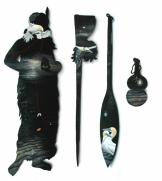Radar
I eat my learning all up; except maths. I mash it into my potatoes,
paste it under the table. I am eight. I hold all the cards.
I will sit there all night. I will never climb down.
Dad lets me go to bed.
He is forty-five, and working too hard.
He is arguing with the teacher. He is only about five.
He has been at it for hours, howling.
You are Uncle Charlie. You are the oldest and you can’t stand it.
You grab him and take off. You say, Wherever Garth was,
there was trouble.
I am four. Dad says he might have to belt me
if I don’t stop. I say, Your pants will fall down.
I have all the answers.
I do what I like.
The weather flashes. Frost crusted on the branches.
You are my Uncle Charlie, with a hard blue stare.
Hello, you say, with your joke: Where’s my stock-whip?
I hide in the chook shed.
You are my brother. You are the boy; just as well you like shooting.
If I am sixteen, you must be twelve. If I have Dad’s twelve-bore,
you have your own four-ten. We’re down the reserve
for scenic birds. Dad teaches us how to give them a lead—
like, at least a foot if they’re going flat out.
We are gorgeous with glee, we sneak so quiet.
I am six. I am standing gingerly behind our first pony.
Get right in close, he says. Bastards can’t kick you so hard
if they can’t get a swing at you.
I am sixteen. You are seventeen.
You are the best rider and you are my sister.
You have to put up with me all the time.
I can’t have everything my own way,
my mother says. I am bewildered.
You are my grandmother.
You live by yourself in the big house.
Mum must be thirty-three, if Dad is forty-seven.
She is always in the middle. I am the middle child,
I carry messages on behalf to my father.
He is a very private man.
He is the Lone Ranger.
He has a silver mare, she can turn on a sixpence;
he rides the range in shocking weather. I go too.
I am afflicted with loyalty all my life.
On Black Friday he lets me ride her,
she gets caught in wires. Whoa! I yell, Whoa!
She kicks and kicks till she flays off all her skin.
Wood in my throat, some imaginary hand on the small of my back
and push, there I go through the woolshed door.
Oh my God, you say, Oh my God.
She doesn’t die, no, she keeps her silver scars.
The patch on your back can never be touched.
You are Gug, you are Edward, my uncle.
For Courage.
I am seven. I stare at your trousers.
If I never see the sea again, you say, that’ll be too bloody soon for me.
If you get another bloody horse book out from library
Dad says, I’ll throw it in the fire. I am eleven. He smokes
and reads Jeeves or Somerset Maugham.
I am twenty-five. You were sixty-two. People say, it’s far too young.
You are my cousin Barbara, you say, He was such a good man.
Red hearts in the trees. Light glaring in.
You are my brother. Winters, you are sick; the rain deliberately falls.
Dad brings you a train set. Electric tension, he struggles with instructions.
Flashes and smoke.
You’re eight and I’m twelve. He sees the Jehovahs on the drive.
Fuck, he says, Go and tell them we’re Catholics.
God swishing in the bushes.
You are Barbara, you are only little, and he won’t answer.
He grins. He is thirty-three.
Grandma said I had to give something up for Lent.
I couldn’t give up smoking and I couldn’t give up swearing
so I bloody-well gave up talking.
She’s never forgotten it.
You arrive late, you’re over eighty
and I don’t know you. You are a townie.
If you’re going to eat it, Grandad says, you learn to kill it.
Throat cutting.
We girls aren’t allowed in the killing shed. Not till it’s gutted
and hung and the head in the creek.
We are to ride away.
Ride right down the road when they dynamite the trees.
We don’t go far, we get a good view; it hangs in the air
like the ashtray and sand we blew up in the house
with a Mighty Cannon.
Dad’s revolver wrapped in a towel
in the second drawer down. We are not allowed.
Gug has a revolver and a Luger he took from a soldier.
We use it to shoot birds in the orchard and he doesn’t come too.
The trees are white with nerves.
Uncle Charlie is eighty-seven. Who’s that girl? He says, I know her,
touching the photo of his sister, Gwen.
Rain slick on the windows, vaseline lights winking from the far land.
You are Gwen. You are eighty-one, and you sigh,
All those beautiful letters he wrote
They just faded away.
I kept them long after the only word you could read was Garth.
Smoke drifting down from the distant sky.
Dad used to run off all the time. Take off across the paddocks.
You always thought Granny was a big woman, but by hell she could run.
Mossy. Watching.
Go, dog, go...

